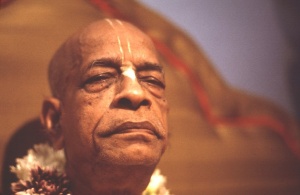SB 6.1.17

A.C. Bhaktivedanta Swami Prabhupada
TEXT 17
sadhrīcīno hy ayaṁ loke
panthāḥ kṣemo 'kuto-bhayaḥ
suśīlāḥ sādhavo yatra
nārāyaṇa-parāyaṇāḥ
SYNONYMS
sadhrīcīnaḥ—just appropriate; hi—certainly; ayam—this; loke—in the world; panthāḥ—path; kṣemaḥ—auspicious; akutaḥ-bhayaḥ—without fear; su-śīlāḥ—well-behaved; sādhavaḥ—saintly persons; yatra—wherein; nārāyaṇa-parāyaṇāḥ—those who have taken the path of Nārāyaṇa, devotional service, as their life and soul.
TRANSLATION
The path followed by pure devotees, who are well behaved and fully endowed with the best qualifications, is certainly the most auspicious path in this material world. It is free from fear, and it is authorized by the śāstras.
PURPORT
One should not think that the person who takes to bhakti is one who cannot perform the ritualistic ceremonies recommended in the karma-kāṇḍa section of the Vedas or is not sufficiently educated to speculate on spiritual subjects. Māyāvādīs generally allege that the bhakti path is for women and illiterates. This is a groundless accusation. The bhakti path is followed by the most learned scholars, such as the Gosvāmīs, Lord Caitanya Mahāprabhu and Rāmānujācārya. These are the actual followers of the bhakti path. Regardless of whether or not one is educated or aristocratic, one must follow in their footsteps. Mahājano yena gataḥ sa panthāḥ: (CC Madhya 17.186) one must follow the path of the mahājanas. The mahājanas are those who have taken to the path of devotional service (suśīlāḥ sādhavo yatra nārāyaṇa-parāyaṇāḥ), for these great personalities are the perfect persons. As stated in Śrīmad-Bhāgavatam (SB 5.18.12):
- yasyāsti bhaktir bhagavaty akiñcanā
- sarvair guṇais tatra samāsate surāḥ
"One who has unflinching devotion to the Personality of Godhead has all the good qualities of the demigods." The less intelligent, however, misunderstand the bhakti path and therefore allege that it is for one who cannot execute ritualistic ceremonies or speculate. As confirmed here by the word sadhrīcīnaḥ, bhakti is the path that is appropriate, not the paths of karma-kāṇḍa and jñāna-kāṇḍa. Māyāvādīs may be suśīlāḥ sādhavaḥ (well-behaved saintly persons), but there is nevertheless some doubt about whether they are actually making progress, for they have not accepted the path of bhakti. On the other hand, those who follow the path of the ācāryas are suśīlāḥ and sādhavaḥ, but furthermore their path is akuto-bhaya, which means free from fear. One should fearlessly follow the twelve mahājanas and their line of disciplic succession and thus be liberated from the clutches of māyā.